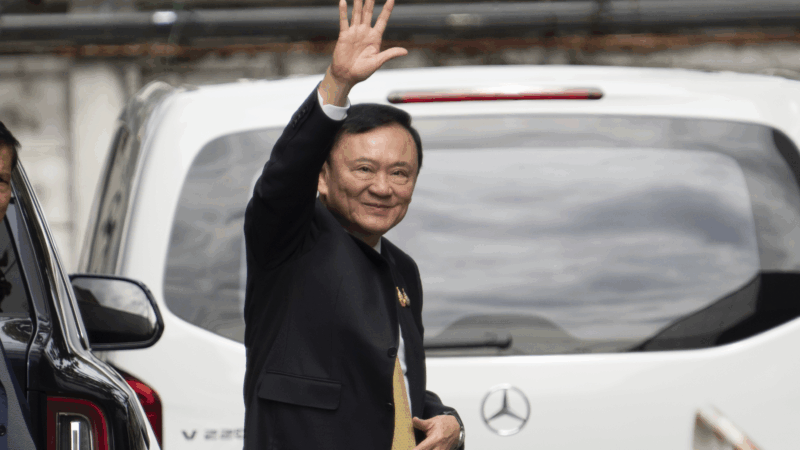Thai court acquits ex-Prime Minister Thaksin Shinawatra of royal defamation charge
BANGKOK — Thailand’s former Prime Minister Thaksin Shinawatra was acquitted of a royal defamation charge by a court on Friday, in a case that could have sent him to prison for up to 15 years.
The 76-year-old Thaksin, smiling as he walked away from the courtroom, was the first to reveal the verdict, responding to journalists’ questions with the single word: “Dismissal.”
His lawyer, Winyat Chatmontree, also confirmed the acquittal verdict, as did the Bangkok Criminal Court later in a news release.
The law on defaming the monarchy, an offense known as lese majeste, is punishable by three to 15 years in prison. It is among the harshest such laws globally and increasingly has been used in Thailand to punish government critics.
The legal aid group Thai Lawyers for Human Rights has said that since early 2020, more than 270 people — many of them student activists — have been charged with violating the law.
The court’s news release said it had found the witnesses and evidence were too weak to support conviction.
Thaksin was originally charged in 2016 over remarks he made a year earlier to journalists in South Korea. The case was not pursued at that time because he was in exile and the necessary legal procedures could not be completed.
The news release said the court determined that the account of the interview presented by the prosecution was incomplete and lacked context, and a key point did not clearly refer specifically to then-King Bhumibol Adulyadej.
It also said the court thought that witnesses in the case against Thaksin might have been motivated by political bias, because they have participated in political protests against him, leaving open the possibility they may have unfairly interpreted his words.
Thaksin’s opponents, who were generally staunch royalists, accused him of corruption, abuse of power and disrespecting then-King Bhumibol, who died in 2016. Thaksin has always asserted that the cases against him were politically motivated.
When he was indicted last year, Thaksin’s freedom on bail was approved with the condition that he could not travel out of Thailand unless approved by court. His passport was confiscated.
Despite facing various prosecutions since leaving office, Thaksin has spent no time in prison. He was abroad in 2006 when a military coupousted him. He briefly returned in 2008, only to return quickly to exile to avoid a possible prison term.
He returned to Thailand in 2023 when the Pheu Thai political party that he is closely associated with came to power. He was sent to serve an eight-year prison term on charges related to corruption and abuse of power but was transferred immediately to a hospital on medical grounds. After six months in a hospital suite, he was granted a pardon and parole and set free.
The decision to send him to a hospital instead of prison was widely questioned as to whether he was granted a special, undeserved privilege. The Supreme Court’s Criminal Division for Political Office Holders will rule next month in another case that puts him in jeopardy of imprisonment.
Since his return, Thaksin has maintained a high profile, traveling the country making public appearances and political observations that could upset the powerful conservative establishment that was behind his 2006 ouster.
His daughter, Paetongtarn Shinawatra, who became prime minister last year, is also in hot water. She stands accused of failing to handle in an ethical manner a June 15 call with Cambodian Senate President Hun Senin which they discussed tensions over territory claimed by both nations. The Constitutional Court suspended her from her duties on July 1 and next week will rule whether she will lose her prime minister position for breaching ethics laws.
Thais have long been accustomed to sudden changes of government due to military coups, numbering more than a dozen since the 1930s. But in the past two decades, they have increasingly seen such changes imposed by the courts, which have ousted four prime ministers and dissolved three election-winning political parties, often on narrow technical grounds.
In most cases, the targets were viewed as challengers to the traditional royalist establishment, whose most powerful defenders are the army and the courts.
Pentagon puts Scouts ‘on notice’ over DEI and girl-centered policies
After threatening to sever ties with the organization formerly known as the Boy Scouts, Defense Secretary Hegseth announced a 6-month reprieve
President Trump bans Anthropic from use in government systems
Trump called the AI lab a "RADICAL LEFT, WOKE COMPANY" in a social media post. The Pentagon also ordered all military contractors to stop doing business with Anthropic.
HUD proposes time limits and work requirements for rental aid
The rule would allow housing agencies and landlords to impose such requirements "to encourage self-sufficiency." Critics say most who can work already do, but their wages are low.
Paramount and Warner Bros’ deal is about merging studios, and a whole lot more
The nearly $111 billion marriage would unite Paramount and Warner film studios, streamers and television properties — including CNN — under the control of the wealthy Ellison family.
A new film follows Paul McCartney’s 2nd act after The Beatles’ breakup
While previous documentaries captured the frenzy of Beatlemania, Man on the Run focuses on McCartney in the years between the band's breakup and John Lennon's death.
An aspiring dancer. A wealthy benefactor. And ‘Dreams’ turned to nightmare
A new psychological drama from Mexican filmmaker Michel Franco centers on the torrid affair between a wealthy San Francisco philanthropist and an undocumented immigrant who aspires to be a dancer.







